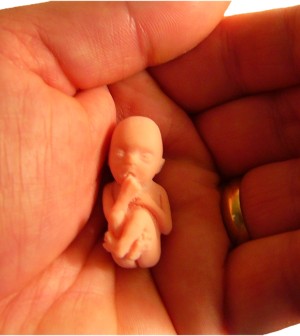- Could Your Grocery Store Meat Be Causing Recurring UTIs?
- Are You Making This Expensive Thermostat Error This Winter?
- Recognizing the Signs of Hypothyroidism
- 10 Strategies to Overcome Insomnia
- Could Artificial Sweeteners Be Aging the Brain Faster?
- Techniques for Soothing Your Nervous System
- Does the Water in Your House Smell Funny? Here’s Why
- Can a Daily Dose of Apple Cider Vinegar Actually Aid Weight Loss?
- 6 Health Beverages That Can Actually Spike Your Blood Sugar
- Treatment Options for Social Anxiety Disorder
Exclusive Breast-Feeding May Ease Transition to Solid Food


Breast-feeding helps prepare babies to eat solid food by creating a healthy population of bacteria in the digestive tract, a small study says.
“We can see from the data that including formula in an infant’s diet does change the gut bacteria even if you are also breast-feeding. Exclusive breast-feeding seems to really smooth out the transition to solid foods,” study first author Amanda Thompson, an associate professor in the anthropology department of the University of North Carolina, said in a university news release.
The researchers followed nine babies from ages 2 weeks to 14 months, collecting and analyzing stool samples along with information about their diets and health.
There were clear differences in the digestive-tract bacteria (gut microbiomes) of babies who were breast-fed only and those who were fed both breast milk and formula. These differences affect a baby’s ability to switch from milk and/or formula to solid foods, and may affect their long-term health, the researchers said.
“We found that babies who are fed only breast milk have microbial communities that seem more ready for the introduction of solid foods,” study senior author Andrea Azcarate-Peril, an assistant professor in the department of cell biology and physiology, said in the news release.
“The transition to solids is much more dramatic for the microbiomes of babies that are not exclusively breast-fed. We think the microbiomes of non-exclusively breast-fed babies could contribute to more stomach aches and colic,” she added.
The study was published Feb. 5 in the journal Frontiers in Cellular and Infection Microbiology.
The researchers said the findings highlight another benefit of breast-feeding and add to growing evidence that the gut microbiome plays an important role in a number of functions, including digestion and infection prevention.
“This study provides yet more support for recommendations by the World Health Organization and others to breast-feed exclusively during the first six months of life,” Thompson said.
More information
The U.S. Office on Women’s Health has more about breast-feeding.
Source: HealthDay
Copyright © 2026 HealthDay. All rights reserved.










